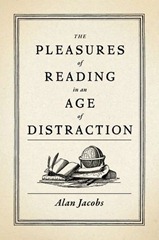 Growing up in a conservative Christian home, I was taught that fiction was a waste of time and that I should be very careful about what I read so that I wouldn’t be seduced by error. I’m grateful that I completely ignored both of those rules. However, I used to read for information and, although I was a voracious reader and enjoyed reading, underlying my reading was always an instrumental assumption that I could use what I learned to advise others or make myself a better person. I also tend to be a person that likes to be organised in my reading – I keep lists of books I want to read and, until recently, I tended to read the next one on the list. It was difficult for me to just “randomly” pick something to read just for pleasure and just because it was of interest at the moment. And I also felt that, at some time in my life, I really needed to read all the “classics” or “great books” in the Western “canon”.
Growing up in a conservative Christian home, I was taught that fiction was a waste of time and that I should be very careful about what I read so that I wouldn’t be seduced by error. I’m grateful that I completely ignored both of those rules. However, I used to read for information and, although I was a voracious reader and enjoyed reading, underlying my reading was always an instrumental assumption that I could use what I learned to advise others or make myself a better person. I also tend to be a person that likes to be organised in my reading – I keep lists of books I want to read and, until recently, I tended to read the next one on the list. It was difficult for me to just “randomly” pick something to read just for pleasure and just because it was of interest at the moment. And I also felt that, at some time in my life, I really needed to read all the “classics” or “great books” in the Western “canon”.
Apparently, I am not alone. According to Alan Jacobs in his delightful book The Pleasures of Reading in an Age of Distraction these types of approaches to “responsible” reading are widespread and part of the way we have been educated to read. But Jacobs will have none of it! He brings a breath of fresh air to reading that lifts any burden we might feel and, instead, recommends we read what we find pleasurable – without shame!
The Pleasures of Reading in an Age of Distraction is a meditative reflection on reading that avoids telling the reader what they should read. No rules here other than some guidelines about gaining the most from reading. Instead, we are to read at Whim. He writes:
… my commitment to one dominant, overarching definitive principle for reading: Read at Whim (italics in original)
….
Read what gives you delight – at least most of the time – and do so without shame.
Jacobs is not suggesting that we do not sometimes read the so-called “great books” that require us to commit to a demanding read. But he likens those to what we might eat at an elegant restaurant – we eat sometimes but not every day. Reading at Whim cannot be the only reason we read. But it is a type of reading we need to recover.
Jacobs does distinguish between lower-case whim and upper-case Whim. The lower-case version
…is thoughtless, directionless preference that almost leads to boredom or frustration or both. But Whim is something very different: it can guide us because it is based in self-knowledge.
Jacobs explores the difference between the two using examples from literature – demonstrating a vast richness of ancient and contemporary sources.
The idea that we can read at Whim is liberating! This book has already changed the way I read. He embraces new technologies (he has a fascinating discussion of the benefits of reading with a Kindle compared to a traditional book) and iconoclastically sweeps away a whole lot tired assumptions that make reading so burdensome for many people.
So… if you want to consider a new approach to reading that has the potential to enliven it again for you, then check out this excellent, Whimsical little book.
No comments:
Post a Comment